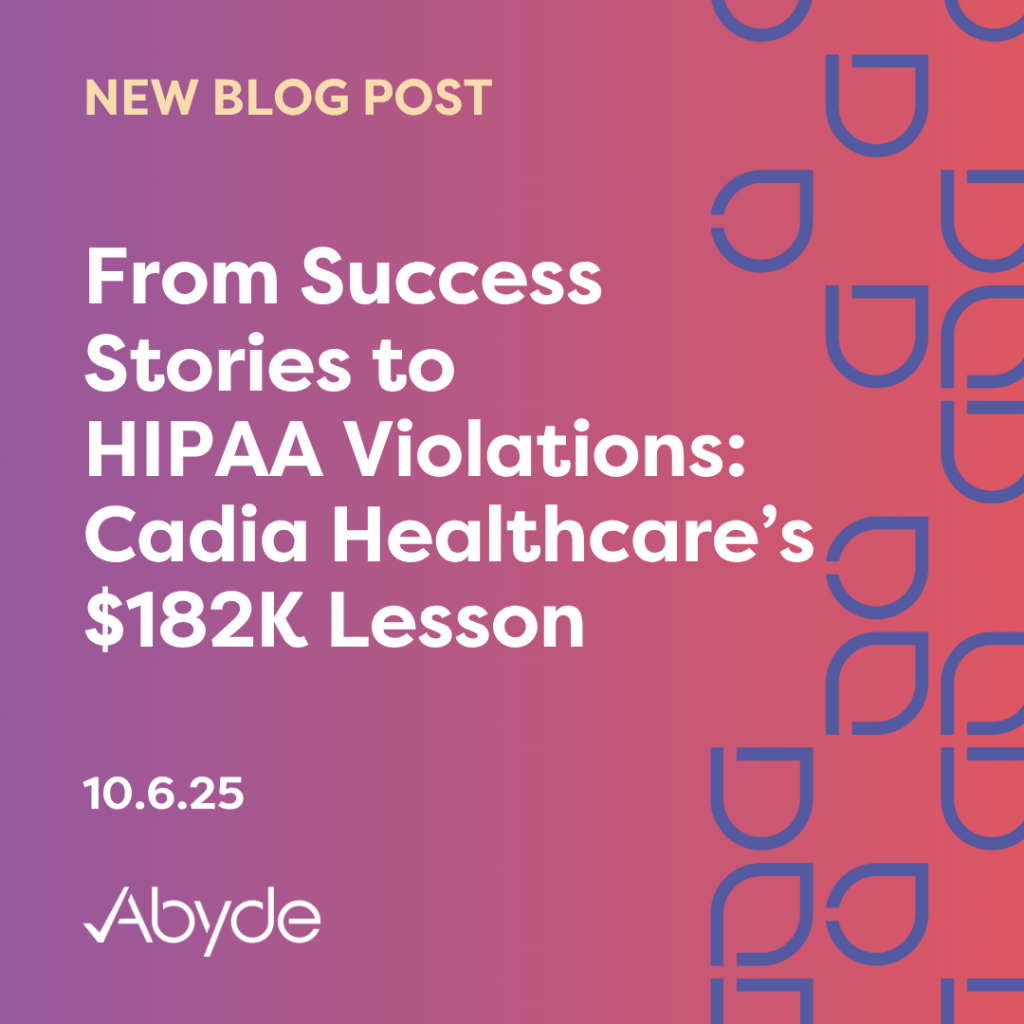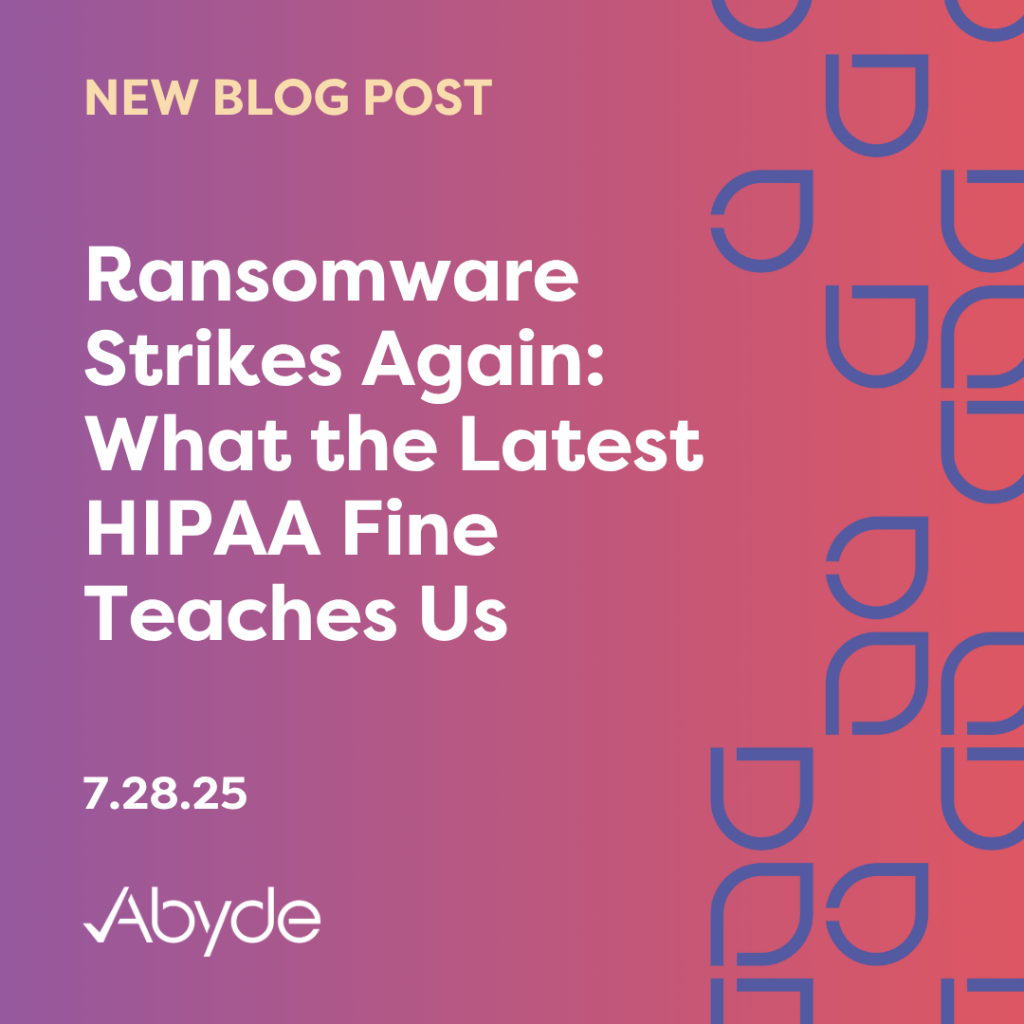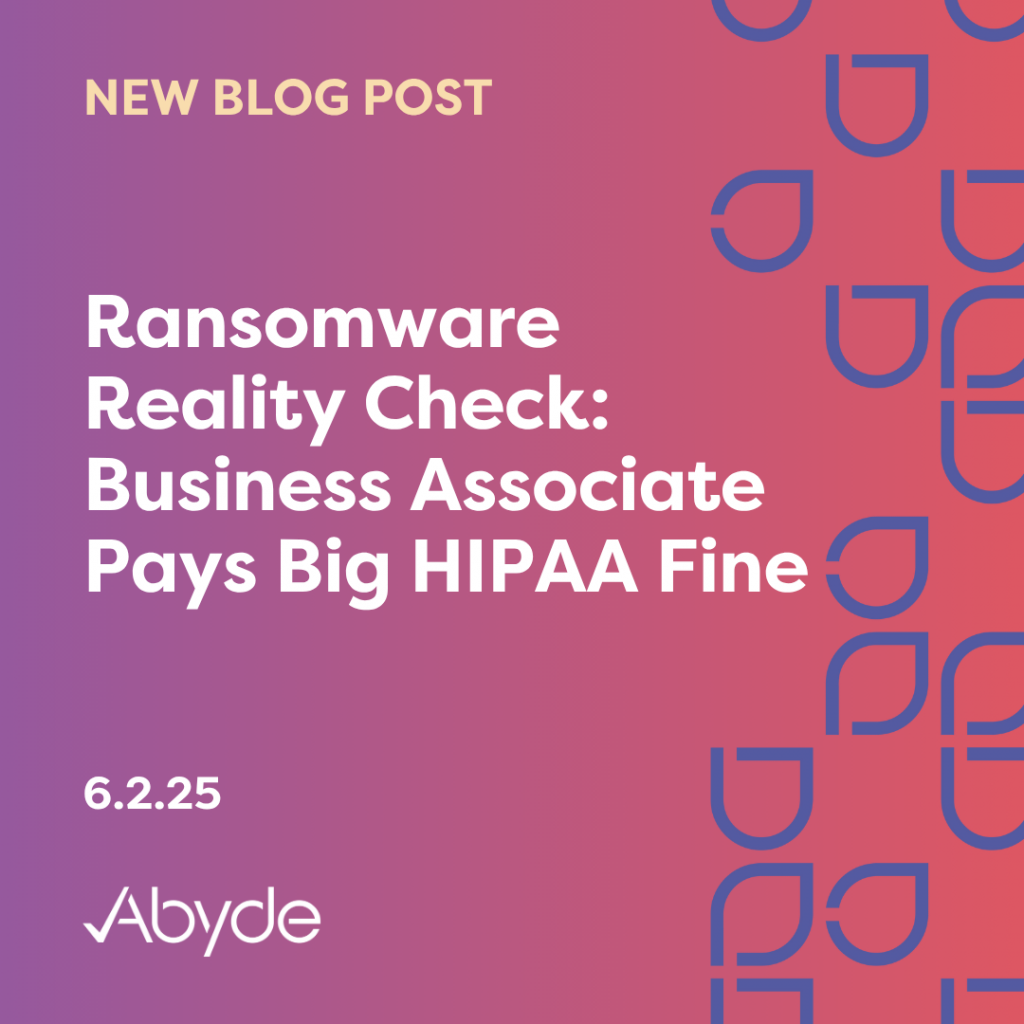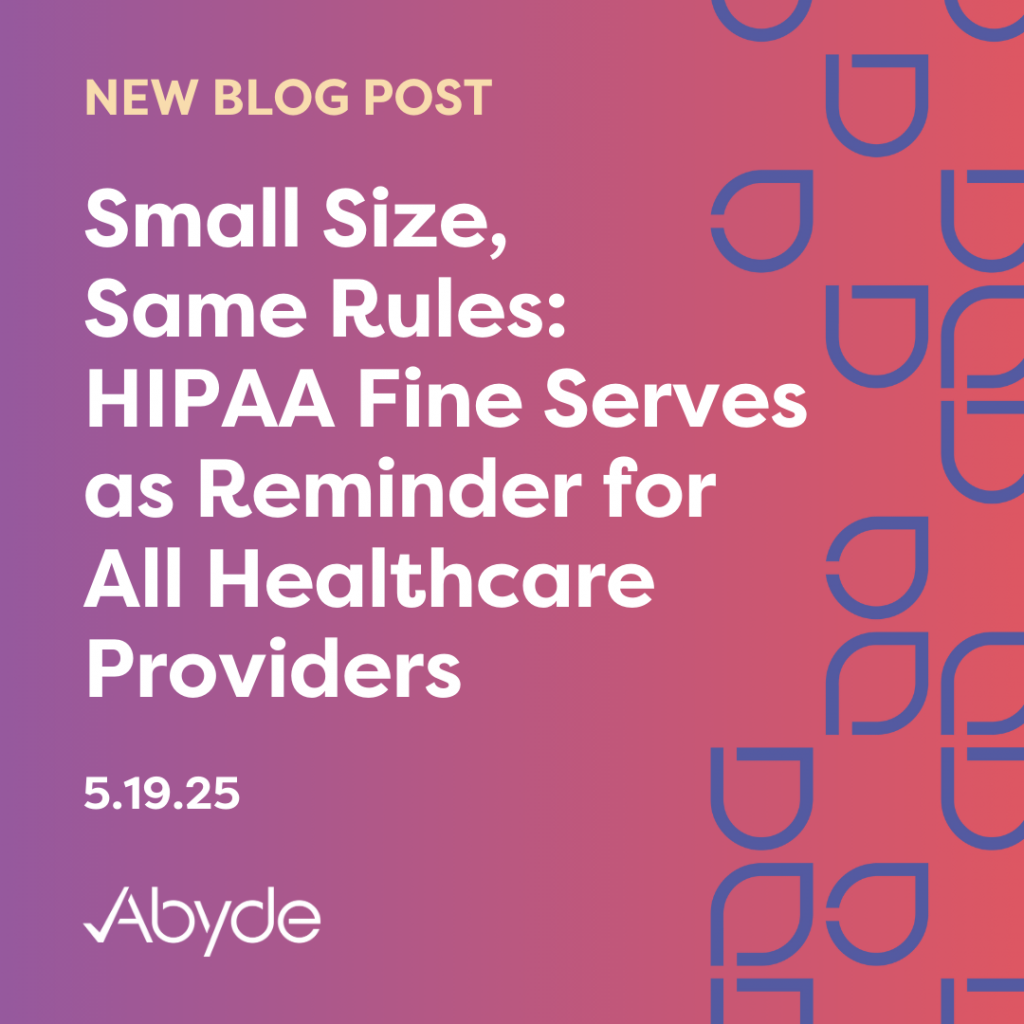October 6, 2025 Remember: sometimes, it’s not your story to tell. While your practice might be excited to share the positive results of quality patient care, it’s your patients’ right to share their stories. Patients’ medical histories and treatment plans are considered Protected Health Information (PHI), and it’s your practice’s responsibility to safeguard all sensitive patient data. Cadia Healthcare Facilities is the latest rehabilitation organization caught in the Office for Civil Rights’ (OCR) crosshairs after improperly disclosing patient health stories online. Notified by a patient complaint, the OCR investigated the organization and settled the violation with a $182,000 fine and a two-year Corrective Action Plan (CAP). A major financial and reputational hit, paired with thorough government monitoring, is a lesson learned for the organization. The 20th fine of the year teaches healthcare practices the importance of HIPAA-compliant marketing, website management, and patient consent. What Happened? The rehabilitation organization implemented a Success Story section on its site, with 150 patients’ stories publicly highlighted on the page. This page had extensive PHI, including a patient’s name, image, conditions, treatment, and recovery plans. While Cadia Healthcare Facilities utilized the website with good intentions, these Success Stories quickly turned into HIPAA horrors. The reason why? Missing HIPAA authorization forms for all 150 featured patients. Then, a patient contacted the OCR with concerns about their image being used without permission on the Cadia Healthcare Facilities website. That’s when the OCR discovered the rehabilitation organization’s noncompliant website and impermissible disclosures. In addition to the fine and government monitoring, the organization must notify all impacted patients that their information was breached on its site, per the Breach Notification Rule. Share Online Compliantly Posting your practice’s accomplishments online might be exciting, but your practice must handle it carefully. Your practice must obtain a HIPAA authorization form before publicly sharing patients’ PHI. This includes before-and-after photos, testimonials, and, in this case, success stories. The forms must be written and specific, and patients can withdraw permission at any time. Your practice’s online presence is likely a new patient’s first impression, so it’s essential to maintain and update your webpage. However, having more likes and views should never outweigh your commitment to compliance and patient protection. Are you confident your staff understands how HIPAA compliance extends to social media and other forms of marketing? With smart software, your practice can easily train and provide staff with the required documents for HIPAA-compliant social media use. The right compliance solution will empower your staff to handle HIPAA compliance with ease, allowing them to build an online presence while keeping patient data safe. To learn more about HIPAA compliance for your practice, meet with a compliance expert today.
Ransomware Strikes Again: What the Latest HIPAA Fine Teaches Us
July 28, 2025 Healthcare’s cybercrime nightmare just got more expensive. With over half a million dollars in fines and the second HIPAA ransomware fine issued this month alone, it’s time to acknowledge the serious threat cybercrimes pose to healthcare. The Office for Civil Rights (OCR) just announced its latest HIPAA fine, following a ransomware attack affecting a surgery center in New York, totalling $250,000 and placing the practice under a two-year Corrective Action Plan (CAP). The two-year period includes constant government monitoring, ensuring the healthcare provider has taken action to mitigate risks and secure Protected Health Information (PHI). Here’s where things get interesting. Upon further inspection, the exact ransomware variant, PYSA, explicitly targets the healthcare industry. Think about it: cybercriminals know the absolute treasure trove of sensitive patient data a healthcare organization holds. As malicious actors know the importance of patient health records, your practice must be extra vigilant when handling PHI. What Happened? In March 2021, an unauthorized actor gained access to the networks of Specialty Surgery Center of Central New York (also known as Syracuse ASC, LLC). The hacker deployed ransomware in the organization’s networks for over two weeks. This ransomware exposed nearly 25,000 patient records, with access to Social Security numbers, addresses, health histories, and more. Syracuse ASC, LLC, notified the OCR of this breach in October 2021, over six months after the initial intrusion. This wait violated the HIPAA Breach Notification Rule. Given the massive breach, the healthcare provider had to notify the OCR, patients, media, and potentially the State Attorney General within 60 days of discovery. Notifying these parties allows patients to take control and explore options for protecting and monitoring their data post-breach. Additionally, it could have expedited the OCR and State officials’ investigations into the extent of the ransomware attack. During the investigation process, the OCR made another startling discovery: no Security Risk Analysis (SRA) was in place. A thorough SRA is required to maintain your practice’s security. By examining existing safeguards, you can identify and address vulnerabilities proactively before they cause problems. This practice learned the hard way about a common HIPAA pitfall: missing an SRA. Due to this, a hacker infiltrated and exploited the vulnerability of an insecure network, leading to a quarter-million-dollar fine. Protecting Your Practice Against Ransomware Hackers have discovered a gold mine with medical records costing upwards of $1000 on the dark web, compared to the average credit card number fetching 25¢. When hackers directly target healthcare practices, your compliance program and safeguards must be in order. Proactive compliance is key to the security of PHI. Your practice can mitigate and minimize ransomware threats by using the right compliance solutions and robust IT assistance. With the right software, it’s easy to streamline pillars of HIPAA compliance, like the SRA, identifying issues early to avoid risking your patients. Meet with our team of experts to learn more about how you can simplify HIPAA compliance for your practice.
Ransomware Reality Check: Business Associate Pays Big HIPAA Fine
6/2/2025 Did you know Business Associates (BAs) are at risk for ransomware attacks just as much as Covered Entities? Ransomware attacks disproportionately affect healthcare organizations, with malicious actors looking to exploit Protected Health Information (PHI). When PHI includes sensitive information such as Social Security Numbers, addresses, phone numbers, and more, it provides someone with a lot of information to use for the wrong reasons. A medical billing BA in Massachusetts, Comstar, LLC, recently experienced the fallout of a ransomware attack. Trusted with the PHI of over 70 practices, the organization did not have the proper safeguards to mitigate risk after a cybercrime. Part of this was a missing Security Risk Analysis (SRA), or a thorough assessment of an organization’s potential vulnerabilities. This latest enforcement represents the responsibility of BAs to uphold their commitments and for all HIPAA-regulated entities to complete and maintain an SRA. What Happened? In May 2022, a malicious actor intruded Comstar’s network servers. Comstar was unaware of this intrusion for several days. In the meantime, the hacker encrypted nearly 600,000 patient records with ransomware. Even though these patients weren’t directly Comstar’s, they assumed the responsibility of protecting their data. While it is not public what steps Comstar took to mitigate risks after the initial ransomware breach, it was discovered that the organization did not complete an SRA. This assessment is at the foundation of a compliant practice and is a requirement of HIPAA. After this discovery, the organization was fined $75,000 and put under a Corrective Action Plan (CAP), or government monitoring, for two years. This assessment is at the foundation of a compliant practice and is a requirement of HIPAA. Recently, the Office for Civil Rights (OCR) has sharpened its focus on this commonly missed requirement with the latest Risk Analysis Initiative. This fine is the 9th enforcement of this initiative. Streamlining the SRA with Software When less than 20% of BAs could showcase a compliant SRA when being audited, completing the SRA is unfortunately a common oversight by regulated entities. Additionally, this is a responsibility of both Covered Entities and BAs, and both parties must carefully handle PHI. With smart software, BAs can easily streamline the SRA and complete the assessment that pinpoints common vulnerabilities organizations face. By simplifying the SRA, intelligent solutions can empower an organization to cultivate a culture of compliance for its staff, securely meet requirements, and handle PHI. To learn more about how your organization can easily complete the SRA, meet with a compliance expert today.
Small Size, Same Rules: HIPAA Fine Serves as Reminder for All Healthcare Providers
May 19, 2025 HIPAA compliance is not just a recommendation; it’s a requirement, no matter how small your organization is. The latest HIPAA fine is a testament to this, with Vision Upright MRI the latest practice to be penalized. The small California MRI center experienced a significant breach, which exposed several violations in the fallout. Acting Office for Civil Rights (OCR) Director Anthony Archeval emphasized the widespread cybersecurity risks, noting that these threats impact healthcare providers of all sizes: “Cybersecurity threats affect large and small covered healthcare providers.” Vision Upright MRI was fined $5,000 and will now face a two-year Corrective Action Plan (CAP), being monitored by the OCR. This fine showcases that no practice, big or small, must be followed to keep patient data safe. What Happened? At the end of 2020, Vision Upright MRI experienced a breach in its systems due to an insecure server. This cybercrime exposed over 21,000 patients’ medical images, leading to the OCR’s investigation. The investigation discovered that the MRI center had never completed a Security Risk Analysis (SRA). The SRA thoroughly examines a practice, reviewing all current safeguards to secure Protected Health Information (PHI). These safeguards can include physical barriers the practice has implemented, like locked doors and alarms, and the administrative techniques the practice follows, like routinely checking access to sensitive patient data. The SRA is critical for a compliant practice and should be completed annually and after any breaches. While the SRA is a fundamental requirement for a practice, it is unfortunately often overlooked. The OCR has implemented a Risk Analysis Initiative to ensure practices are completing this requirement, and has reinstated the audit program, reviewing if regulated entities are maintaining this document. In addition to missing the SRA, Vision Upright MRI did not properly notify affected parties within 60 days, violating the Breach Notification Rule. The Breach Notification Rule requires practices to notify patients within 60 days of discovering a breach, regardless of how many were impacted. This short timeline allows patients to take the necessary precautions for the safety of their data. The practice should also provide credit monitoring. Since this event impacted well over 500 patients, the threshold to consider the situation a large breach, Vision Upright MRI also needed to notify the media and the OCR within a 60-day timeline. Communicating this is imperative, allowing the OCR to swiftly begin its investigation and potentially affected patients to receive information through media channels. These serious missteps led to the monetary settlement and years of government monitoring. Streamlining HIPAA Compliance Even a small practice doesn’t require overwhelming resources to be HIPAA compliant. The right compliance program can simplify HIPAA compliance. With smart solutions, the SRA can be completed easily, reviewing questions and potential vulnerabilities the practice faces. Additionally, breaches can be reported in intelligent software, with compliance experts assisting practices through alerting patients and the OCR. Meet with an expert today to learn how to automate your compliance program.
HHS Announces New Divisions Within the OCR
March 14, 2023 EXTRA EXTRA READ ALL ABOUT IT!! The U.S. Department of Health and Human Services, through the Office for Civil Rights (OCR), announced the formation of a new Enforcement Division, Policy Division, and Strategic Planning Division. Why isn’t this front-page news? And why did the HHS need to form three new divisions? “OCR’s caseload has multiplied in recent years, increasing to over 51,000 complaints in 2022– an increase of 69 percent between 2017 and 2022,” said OCR Director Melanie Fontes Rainer. “…reorganization improves OCR’s ability to effectively respond to complaints, puts OCR in line with its peers’ structure, and moves OCR into the future.” The OCR will now reflect the structure set by the U.S. Department of Education’s Office for Civil Rights. The Strategic Planning Division will not only work to coordinate public outreach to protect civil rights and health information privacy. They will also expand data analytics and coordinate data collection across HHS leadership. With the OCR being proactive and educating the public on their rights, now would be the time to make sure you are being proactive with HIPAA. What is something to make sure you are staying compliant and one step ahead of the OCR? How about your Security Risk Analysis or the “Crown Jewel” of the OCR as we like to call it. It’s the first thing the OCR asks for when they come knockin’. So why not beat them to the punch? You’ll identify and assess potential threats and vulnerabilities to protected health information (PHI), as well as evaluate the effectiveness of the organization’s security measures and policies. A HIPAA Security Risk Analysis is an ongoing process that must be regularly reviewed and updated to ensure that the organization remains in compliance. Guess what, here at Abyde we automate the entire process for you. Extra, extra, HIPAA violations can result in severe consequences, including fines, legal action, and damage to a healthcare organization’s reputation. Therefore, it is critical for healthcare providers and organizations to prioritize HIPAA compliance and regularly review and update their policies and procedures to ensure they are in line with the latest regulations.
The Department of Health and Human Services Appoints Melanie Fontes Rainer as the New Office for Civil Rights Director
September 19, 2022 Did you check the news??? There’s a new sheriff in town and her name is Melanie Fontes Rainer! Recently announced, the Department of Health and Human Services (HHS) has appointed former Acting Director, Melanie Fontes Rainer, as the new Director of the Office for Civil Rights (OCR). Fontes Rainer has extensive experience in her career, serving as an Acting Director for the OCR and before that Counselor to Secretary Becerra. Secretary Becerra stated, “Melanie has devoted her entire professional career to public service and has worked tirelessly to ensure that health care is accessible, affordable, and available to all, no matter where you live or who you are.” Fontes Rainer brings over 10 years of experience in civil rights, healthcare policy, and patient privacy. She was also involved in the 21st Century Cures Act, the Affordable Care Act, and the No Suprise Act. Fontes Rainer took part in ground-breaking settlements and created the first office that focused on health care rights and access in California. Melanie’s background, combined with her passion, will prepare her for the challenges she will face in her new role as OCR Director. It is important to take into account that after Lisa J. Pino, former OCR Director, was appointed last year, we saw a surge in enforcement cases right away. Only a few months into Pino’s appointment as director, the OCR announced five Right of Access settlements in one day. This year we have already seen 17 including a record-breaking day with 11 settlements announced in just one day alone. With settlements totaling $1,992,140 already in 2022, the OCR clearly isn’t done yet. As we can see, between HIPAA violations, cybersecurity issues, and personal information privacy, practices continue to face challenges this year. But we can also see that Fontes Rainer is here to help, bringing years of expertise and fiery passion to the table. She enforces healthcare regulations, promotes healthy practice operations, and protects patient health information across the country. With years of dedication to civil rights and medical privacy, we can definitely expect to see a lot of settlements surfacing with Fontes Rainer in town.
OCR Announces Eleven More HIPAA Right of Access Settlements
July 18, 2022 Waking up every morning is an eye-opening experience. Do you know what else is an eye-opening experience? Waking up to see all of the enforcement investigations the OCR launched against practices like yours. The U.S. Department of Health and Human Services (HHS) Office for Civil Rights (OCR) announced the completion of eleven investigations in its Health Insurance Portability and Accountability Act (HIPAA) Right of Access Initiative. Under the HIPAA Privacy Rule, the OCR launched this effort to assist individuals’ right to timely access to their health records at a reasonable cost. HIPAA provides individuals with the right to view and get copies of their health information from their healthcare providers and health plans. A HIPAA-regulated entity has 30 days after receiving a request to provide an individual or their representative with their records in a timely manner. OCR Director, Lisa J. Pino, states, “Health care organizations should take note that there are now 38 enforcement actions in our Right of Access Initiative and understand that OCR is serious about upholding the law and peoples’ fundamental right to timely access to their medical records.” Practices are no longer sneaking under the radar! The Office for Civil Rights (OCR) just concluded its thirty-eighth enforcement action since the HIPAA Right of Access Initiative began in 2019. Totaling over $646,000 across eleven penalties, the announcement of the verdicts includes eleven cases. Here is a brief breakdown of a couple of the cases just released by HHS: The first dental action includes a $5,000 settlement for failure to comply with the Right of Access provision stating covered entities must permit individuals to inspect and obtain a copy of their PHI. An eye care practice made the mistake of not providing a copy of a patient’s medical records until three days after the OCR investigated. Now that is crazy! To settle a potential violation of the HIPAA Privacy Rule right of access standard, the practice agreed to take corrective actions and pay $22,500. Something as simple as not giving your patients access to their data quickly enough can result in a huge fine! One not-for-profit health system learned the hard way by not responding timely enough to a complainant’s access request. This cost the health system a whopping $240,000! So, whether it’s responding to a request or delivering that request on time, you need to make sure your practice is on point to avoid these heavy penalties. As we can see the queen bee (Lisa Pino) isn’t joking around on pushing the OCR’s HIPAA Right of Access Initiative across practices, we encourage you to ensure you have the right HIPAA compliance measures in place. So what’s the holdup? For less than a scratch-off ticket a day you can save your practice from those sneaky fines and become friends with Abyde today!
MORE MONEY, MORE PROBLEMS? OCR Budget Proposal Will Result in Greater Enforcement and More Fines
May 16, 2022 If you think the Department of Health and Human Services (HHS) Office for Civil Rights (OCR) isn’t zeroed in on compliance, think again. OCR recently announced its request for a 55% increase in its overall funding, for a total of $60.2 million for the 2023 fiscal year. While this number may seem shocking, their plans for the money may make your jaw drop. Let’s take a look at why the increase is needed. Nearly 46,000 complaints were received in FY 2021, a dramatic increase from nearly 2,000 in 2003. Just this year, they’re expecting more than 28,000 related strictly to HIPAA. OCR states, “given the trend in complaints to OCR as well as the priorities articulated by the Administration, OCR anticipates a significant increase in the number of civil rights, information breaches, and cybersecurity complaints.” OCR opens an investigation for any breach that affects more than 500 people. In 2021, there were 714 of those instances, more than 30% growth over the last two years. Currently, OCR is limited to how many of these they can conduct a full investigation on. Imagine how powerful this could be if granted the resources to execute the necessary amount?! In addition, OCR is looking to add more regional investigators to address the backlog of existing complaints. With a goal of clearing the backlog by FY 2026, $8 million will be allocated to address the existing complaint inventory. OCR supports adding new regional investigators to “resolve new civil rights and HIPAA cases, address the backlog of complaints, and initiate compliance reviews in the Administration’s priority areas.” With a staff of 77 in 2020, they plan to add an additional 37 investigators and supervisory investigators in FY 2023. The budget accounts for a total increase of 64%, equating to 91 new employees. More staff could mean more knocks on your door! Still think that you’re the one that got (or will get) away?! This next bit is for you. Increasing fines and the institution of injunctive relief are more immediate than 2023. Not sure what a HIPAA violation could cost you? Don’t go get a tattoo of these any time soon – OCR is requesting increases based on a federal court evaluation. In 2019, then-OCR Director Roger Severino published a “notice of enforcement discretion” complementing the HITECH Act basing violation amounts on the party’s awareness and fault. While you could imagine this leaves some room for interpretation, the tiered fine structure will remain in place. Changing lanes, Injunctive relief essentially restrains a party from a certain action. OCR regulator, Adam Greene openly notes the HITECH Act “provides attorneys general with authority to seek injunctive relief.” Green continues to state, “If OCR were given authority to obtain injunctive relief, then it could require entities to take or discontinue actions –such as by requiring an entity to provide an individual with access to records or to discontinue a use or disclosure of protected health information – rather than only being able to penalize the entity after an act or omission occurs.” If you still aren’t convinced that OCR means business, let’s wrap up with a summary of what their request for extra dollar signs means for you. An increase in budget simply equates to an increase in resources – more employees to not only attack the existing backlog but the ability to complete more in-depth and frequent investigations. Higher fines and more meaningful corrective action plans mean greater penalties and violation costs. We hope you take your compliance seriously, OCR certainly is! Let us navigate these upcoming changes with you – from our simple software to our readily available education, we will be your companion in confidence that you are set up for any OCR changes that come our way.
OCR Highlights Asset Log as Key HIPAA Recommendation
August 25, 2020 Earlier today, the Office for Civil Rights (OCR) sent out their seasonal Cybersecurity Newsletter on a very timely and relevant topic – the importance of keeping track of devices that contain electronic protected health information (ePHI). The OCR’s newsletter highlights two important things for independent practices: first, that having an asset log is the recommended method for tracking and thus safeguarding devices that contain ePHI, and second, that the OCR views practice’s lack of knowledge around where their devices are as a key area of concern. Part of the HIPAA Security Rule, practices are required to implement the necessary technical safeguards covered in the Security Risk Analysis (SRA) – including encrypting and securing their devices that contain sensitive ePHI. While an asset log isn’t directly required under HIPAA, the OCR highly recommends the creation and maintenance of an IT asset inventory to better understand where ePHI may be stored and strengthen overall compliance with these requirements. What does an Asset Log entail? We know it’s hard to keep tabs on everything within your practice, but when it comes to your devices keeping inventory is key. As the OCR’s newsletter highlights, the asset log should be a comprehensive list of all IT assets with corresponding descriptive information. The OCR notes that this list could include ALL devices, even those that don’t access ePHI directly, as they could contain ePHI unknowingly or be an entry point for cyberattackers to your network. Your list should include: When documenting these assets, Abyde recommends including all the following information: Additionally, it is important to regularly update your asset log as devices are moved around by location or by assigned staff members. Just like an SRA, your asset log should not be a ‘one and done’ project, and should instead be reviewed regularly. You should also track when devices are disposed of, as properly disposing of devices that contain ePHI is a common cause of HIPAA violations. No matter the size of your practice, creating and maintaining a thorough asset log isn’t an easy task. With a program like Abyde, our built in Asset Log covers all the OCR recommendations and then some – helping you track devices at high risk and making your IT inventory intuitive. Having the ability to access your asset log within a cloud-based solution like Abyde makes reviewing and updating inventory a breeze, and helps ensure you’re complying with all the right technical safeguards.








